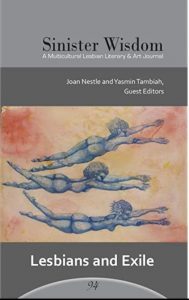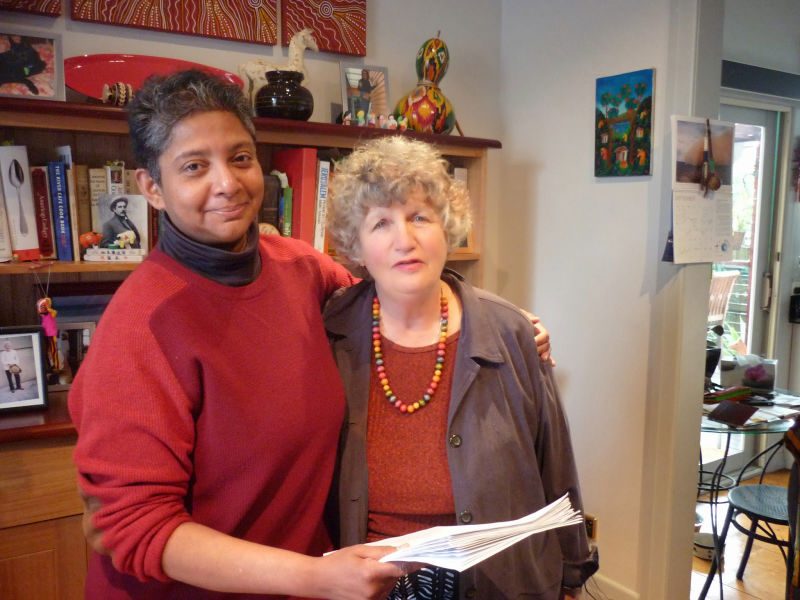Crossing Borders; Joan Nestle guest edits landmark lesbian journal Sinister Wisdom on the theme of exile.
In an era of mainstreaming minority rights and mass social media, would a lesbian journal from the 1970s still have relevancy or much of topical interest to say? Damn straight it would. Sinister Wisdom, founded in 1976, just two years after Joan Nestle co-founded the Lesbian Herstory Archives, and edited by lesbian-feminist luminaries including Michelle Cliff and Adrienne Rich, is a lesbian literary and art journal published three times a year, and currently edited by Julie R. Enszer.
It is multicultural in scope, diverse in voice, and addresses important issues that continue to divide us.
The fall issue of Sinister Wisdom, out on October 15, takes as its theme Lesbians and Exile which, after a summer of global terror and war, the conflicts of which show no end, is extremely relevant.
Nestle, who was born in the Bronx in 1940 and spent most of her life in New York City, forged her identity in an emerging lesbian culture—from the butch-femme socio-sexual dynamic of the bars of Greenwich Village to feminism and the civil rights movement. She has seen it all, and her reflections are to be found in numerous compelling books including A Restricted Country and A Fragile Union, five anthologies, and her blog (joannestle.com).
At 73, she has a long memory and extended insight into queer cultural debates. A lesbian elder and cultural icon, Nestle, who moved to Melbourne in 2002 to be with her lover, Australian academic Dianne Otto, now holds a global perspective of these debates.
Sinister Wisdom 94: Lesbians and Exile is wonderfully co-guest edited by Nestle, and by Yasmin Tambiah, a researcher and award-winning writer who grew up in Sri Lanka during a time of war. Tambiah’s parents fled as refugees to live in Sydney, Australia, and this issue is dedicated to Sunila Abeysekera, a Sri Lankan feminist and human rights activist and explores the challenges faced by lesbians around the world, against a backdrop of discrimination, dislocation and war.
There are articles by lesbians from Europe, Eurasia and the Middle East, detailing the experiences of activists, immigrants, and the exiled.
Nestle and Tambiah, who are friends outside of this project, wish to engage the reader with messages of resistance and survival; to “provoke questions about…the term exile by including a spectrum of other processes and states of dislocation, displacement, eviction, illegitimacy, and rejection. These states cannot be considered without simultaneously foregrounding acts of dissent, resistance, and transformations, and always from a lesbian perspective or on a lesbian continuum.”
Today, sexuality and gender identity—and the rights of women—are still being hotly debated, and exile is a lens through which identity politics can be examined. “This is part of a re-emergence on my part,” says Nestle.
“Probably thirty years ago, Adrienne Rich asked me to be on the board [of Sinister Wisdom], and our politics, especially regarding sexuality, were not always similar. … Then, just a few years ago, Julie Enszer called me long distance in Melbourne and said, ‘We see you’re on the board but you haven’t been active. Would you like to be?’
And I thought, There are new currents in lesbian thinking. It’s time to revisit Sinister Wisdom. I saw they had an open issue so I said, ‘I have an idea, I have a dear writing friend in Sydney called Yasmin Tambiah who I’ve been kicking around a writing idea with about lesbians and home and what that means,’ ”recalls Nestle.
With so much dislocation and displacement happening in the world, and especially discrimination against women, Nestle decided now was the time to act on that idea. Notably, Nestle has blogged about the heartbreaking conflict between Israel and Palestine, and she has, as an American expatriate, experienced dislocation and powerlessness when crossing borders. While she has lived in Melbourne for 16 years and is now a permanent resident, there were times when ‘home’ was completely uncertain.
“At one point we went back to [Australia] and we didn’t know if I had a visa and if I’d be put on a plane back [to the U.S.]. There was a searing moment that I will never forget and yet I am grateful for having. Because I had the best of New York lives, an apartment on 92nd Street, minimal rent…and all of that changed, and that brought me to that moment at the border where Di was on her side of the border, there was a checkpoint, and a man in a uniform could at that moment say, ‘You get right on that plane and you go back.’ ”
This moment of powerlessness is one that many lesbian couples experience once they leave ‘home’. Thankfully, Nestle found out through her immigration lawyer that her tourist visa had been accepted in the nick of time. She had viscerally experienced an important lesson. “It’s at the borders,” says Nestle, “Where all kinds of expressions of the heart and body are being challenged, are being denied.
There’s a new kind of lesbian center of things for me, for instance: if you think of the normalizing of the lesbian experience that is going on today with marriage; the freedoms that we have fought for and have, like serving in the military and becoming a citizen in many ways—that is one story to be told.
 “But I have lived long enough, from the McCarthy era onwards, to know that when you move to the center in a way that pleases the state—becoming consumers, becoming the wearers of the national uniform, spending thousands on weddings—the state no longer sees you as a deviant, particularly if you follow through on its political agenda, which means hating the right people. I was concerned about the lesbians who were dissenters at the borders.”
“But I have lived long enough, from the McCarthy era onwards, to know that when you move to the center in a way that pleases the state—becoming consumers, becoming the wearers of the national uniform, spending thousands on weddings—the state no longer sees you as a deviant, particularly if you follow through on its political agenda, which means hating the right people. I was concerned about the lesbians who were dissenters at the borders.”
As we race towards mainstream acceptance, these are good questions to ask: What happens to the dissenters amongst us who don’t want to assimilate? Who don’t want to get married, get a mortgage, have kids, and spend their weekends at Home Depot. Will there be a place for them in our community, or will we apprehend them at the borders for not conforming?
“Sinister Wisdom flies the flag of lesbian,” says Nestle. And that, she asserts, means all lesbians—not just those approved by the state. She does not wish to divest herself of her dissenting past. Even though “freak” was the first thing she was called, she does not even wish to leave that part of her identity behind.
“No one part is more important than the other,” she urges. In this spirit the journal weaves together many voices including that of a lesbian of African descent who has a transgender partner, who describes what it feels like to walk the streets of Haifa, Israel together. “She becomes an exile in all kinds of ways,” says Nestle.
Nestle’s and Tambiah’s aim with this issue of Sinister Wisdom was to “open up new discussions about all the ways we’re queer and lesbian, and who are the new exiled,” she says.
And the new exiled could be you or me or someone we love.
